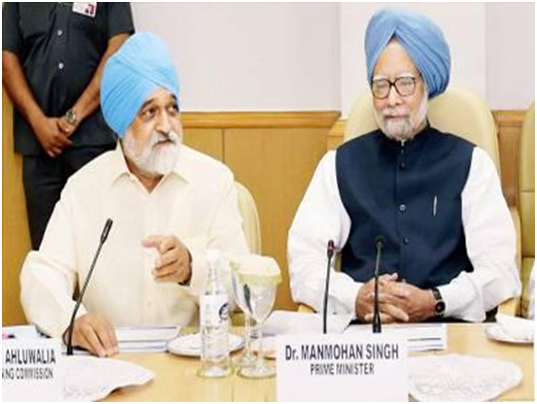THINK TANK REPLACES 64 YEAR OLD PLANNING COMMISSION
Montek Singh Ahluwalia(left) goes into the history as the last Deputy Chairman of the Planning Comm.

The government has consigned to fire the Planning Commission, a 64-year old apex policy making body, and replace it with a new ‘think tank’ institution to address the emerging economic needs and strengthen federal structure. "We will very soon set up a new institution in place of Planning Commission. Sometime it becomes necessary to repair a house. It costs a lot of money. But it does not give us satisfaction. Then we feel it is better to make a new house," Prime Minister Narendra Modi said in his Independence Day address to the nation.
In his maiden Independence Day speech, Modi said the new think tank, which may be called the National Reforms and Development Commission (NRDC), will undertake a deeper study of the country’s problems and offer solutions with the involvement of states. The prime minister also sent out a strong message of his government being in command to undertake big development projects across the country and usher in the required changes.
True, the Planning Commission itself is not what it was in the era of highly centralised, predominantly public sector-led planning. The Commission’s role is now largely limited to formulating long-term growth plans, devising sectoral targets for meeting these, and acting as an intermediary between the States and Central Ministries. Its approach, too, has changed to one of ‘indicative planning’; aiming at indirectly influencing decisions by market players rather than fixing mandatory production quotas. The “new institution”, according to Modi, will respect the country’s federal structure and emphasise public-private partnerships (PPP).
However, Modi said, "the internal situation of the country has changed, global environment has changed... If we have to take India forward, then states will have to be taken forward. The importance of federal structure is more today than it was in last 60 years”, he said.
The Planning Commission was set up in March 1950 by India's first Prime Minister Jawaharlal Nehru to promote a rapid rise in the standard of living of the people by efficient exploitation of the resources of the country, increasing production and offering opportunities to all for employment in the service of the community.
The announcement was received with a positive spirit by the industry. "Creative thinking is required for building a new India with public private partnership and optimum utilization of resources and power to the states," the Confederation of Indian Industry said.
Welcoming the decision, former Planning Commission member Bimal Jalan said: "It is very good idea. Planning has become outdated concept now. There is a need to modernise it. We have to see the blueprint of the new concept. But change was very much required".
However, the Congress party slammed it. "This appears to be an attempt to centralise powers in the hands of one individual," said senior leader and former minister Ghulam Nabi Azad.
Formed by a resolution of the Government of India March 15, 1950, the commission started presenting the Five Year Plans from 1951 -- disrupted a few times by the India-Pakistan war and drought. Currently, the panel is overseeing the 12th such plan, 2012-17. Prime Minister Nehru was its first chairman, with Gulzarilal Nanda as the deputy and V.T. Krishnamachari, Chintaman Deshmukh, G.L. Mehta and R.K.Patil as members.
According to officials in the know, Modi never had much of a regard for the commission and considered it a relic of the command economy that India tried to emulate from the then Soviet era. Several states have complained that the plan panel, which more or less approves their annual plans, misuses its discretionary powers, even acting and taking biased politically motivated decisions.
The panel's redundancy was also the conclusion of the Independent Evaluation Office set up by the commission itself under Ajay Chibber, a Stanford-educated former assistant secretary general of the United Nations.
"It is clear the Planning Commission in its current form and function is a hindrance and not a help to India's development," said the Annual Planning Commission Report of 2014, which became quite controversial as some said it had exceeded its brief. “It is not easy to reform such a large ossified body. It would be better to replace it with a new body that is needed to assist states in ideas, to provide long-term thinking and to help cross-cutting reforms," it said.
"Since the Planning Commission has defied attempts to reform it to bring it in line with the needs of a modern economy and the trend of empowering the states, it is proposed that the Commission be abolished," the report said.
Another notable takeaway from Modi’s speech was the stress on manufacturing, whose share in the country’s GDP has slipped to below 15 per cent. The Prime Minister’s stress on the need to make things in India and reduce import dependence, especially in electronic/IT products, cannot be faulted. While this may, on the face of it, suggest going back to the discredited import substitution policies — contradictory to the spirit behind dismantling the Planning Commission — Modi’s message was clearly more positive. Far from restricting imports, this was an invitation to foreign investors to “come and make in India” everything from automobiles, chemicals and pharmaceuticals to satellites and submarines — an advertisement of India’s nascent competitive strengths in manufacturing.
But like all good speeches with substance, this one too will eventually be judged by how Modi walks the talk by translating it into action. That is what country looks forward to.
In the end I still believe that Think Tanks are just ‘think tanks’. They provide a platform for discussion, even if they shed more heat than light. With Parliament almost incapable of serious debate, informed discussion and civilized discourse, where does this nation get its intellectual churn? Let us hope that Modi’s NRDC will help in the substantial growth of the country.



